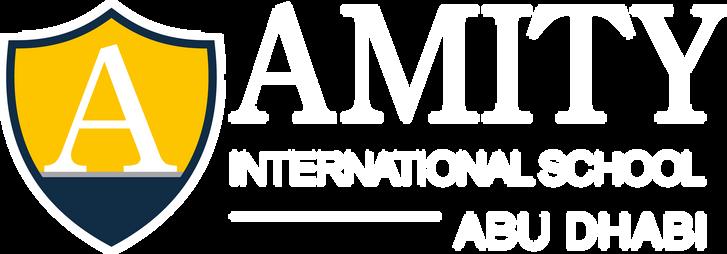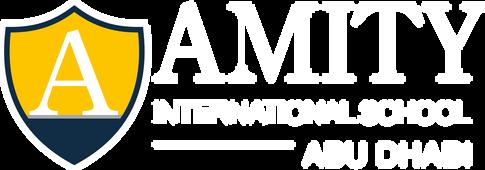

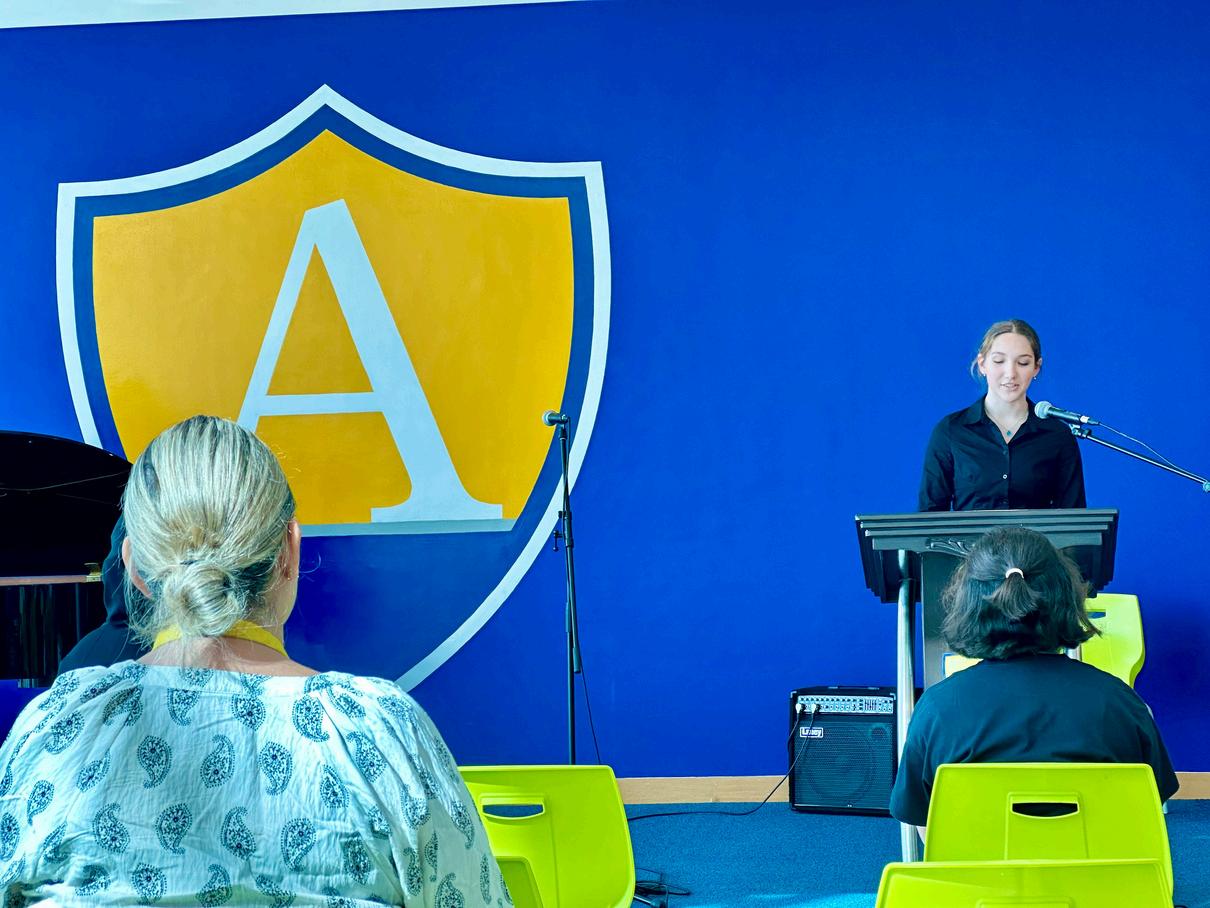
YEAR 12 BOOKLET 2025- 2026
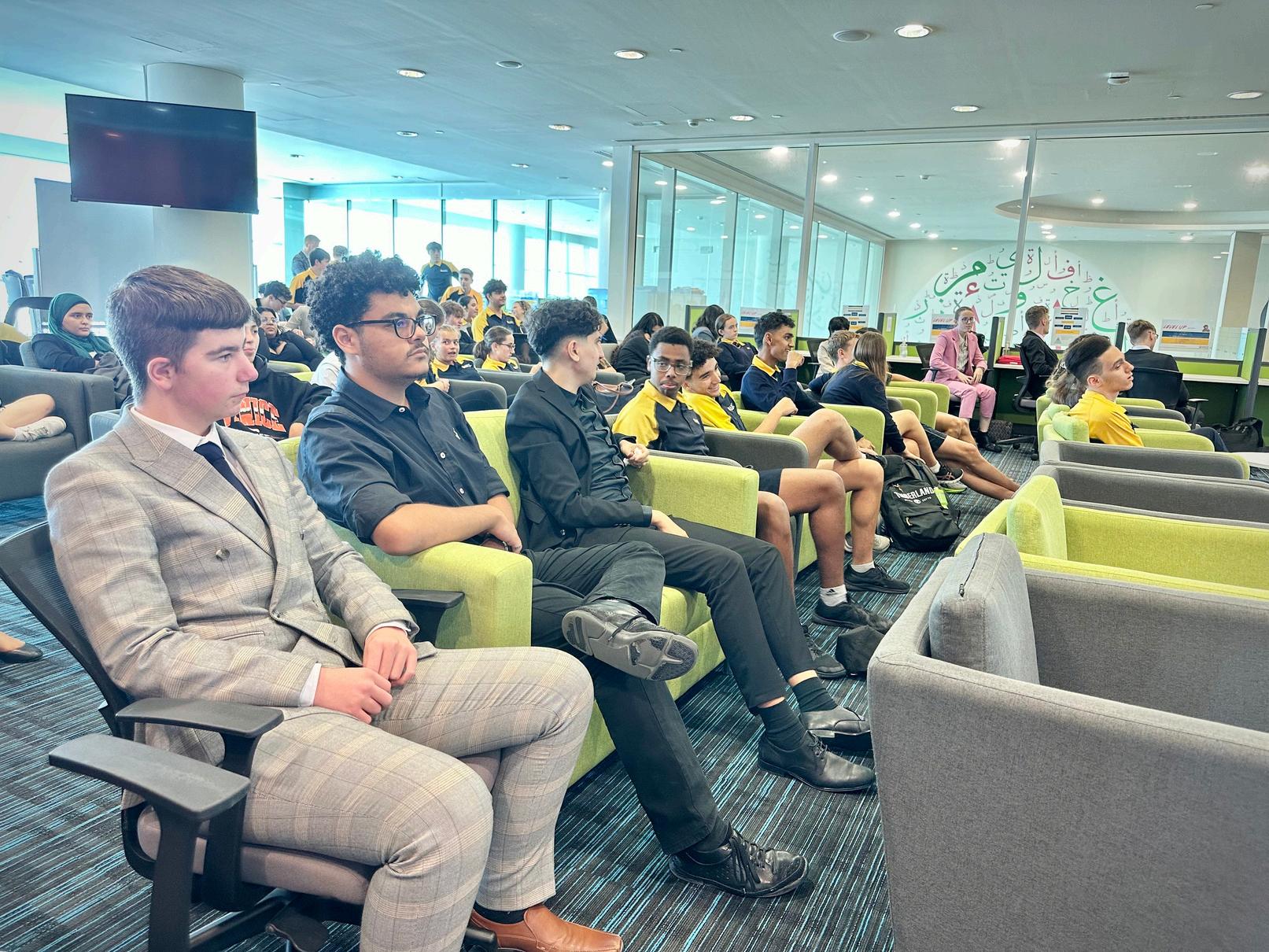





YEAR 12 BOOKLET 2025- 2026


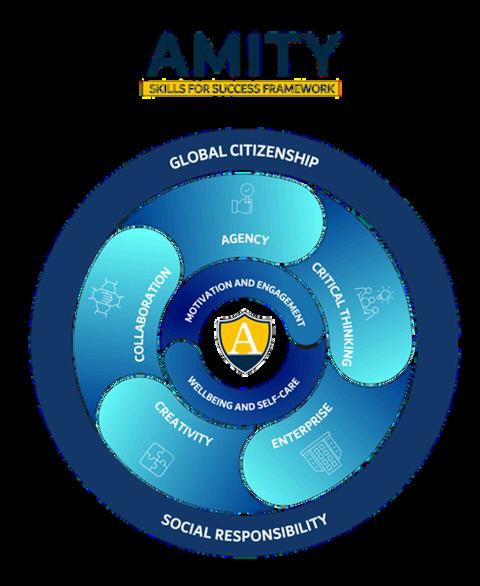
The Skills for Success, underpinning the curriculum across the school, are essential for preparing the youngest through to the oldest students to thrive in and beyond Amity. At the centre of the Skills for Success are Wellbeing and Self-care and Motivation and Engagement Wellbeing and Self-care recognises holistic development including emotional and mental health, both of which are addressed through robust pastoral systems and the additional provision offered by inclusion and school counsellors. Alongside this, Amity recognises that motivation and engagement are pivotal factors in meaningful and successful learning, underpinning participation, achievement, and joy, both inside and outside the classroom setting Agency, the ability to take initiative and drive one's learning, empowers students to be active participants in their educational journey. Creativity fosters innovation,
encouraging students to approach challenges with fresh perspectives, enhancing problemsolving abilities. Critical thinking cultivates analytical skills, enabling students to evaluate information, make informed decisions, and adapt to diverse situations. Collaboration emphasises the importance of working harmoniously with others. By instilling effective teamwork, students develop interpersonal skills crucial for success in both academic and social spheres. Students equipped, motivated and engaged with these skills can manage stress, build resilience, and maintain overall well-being. Through Enterprise, students apply agency, creativity, critical thinking, and collaboration to real-world scenarios, preparing them for future professional challenges.
Social Responsibility and Global Citizenship serve ‘to wrap around’ these skills in action Social Responsibility emphasises the ethical use of these skills, encouraging students to consider the impact of their actions on a broader societal scale This fosters a sense of empathy and community engagement. Being internationally minded adds a global dimension to these skills, preparing students for an interconnected world As an international school with over 70 nationalities, exposure to diverse perspectives promotes cultural awareness, fostering open-mindedness and adaptability supporting each school’s curriculum.
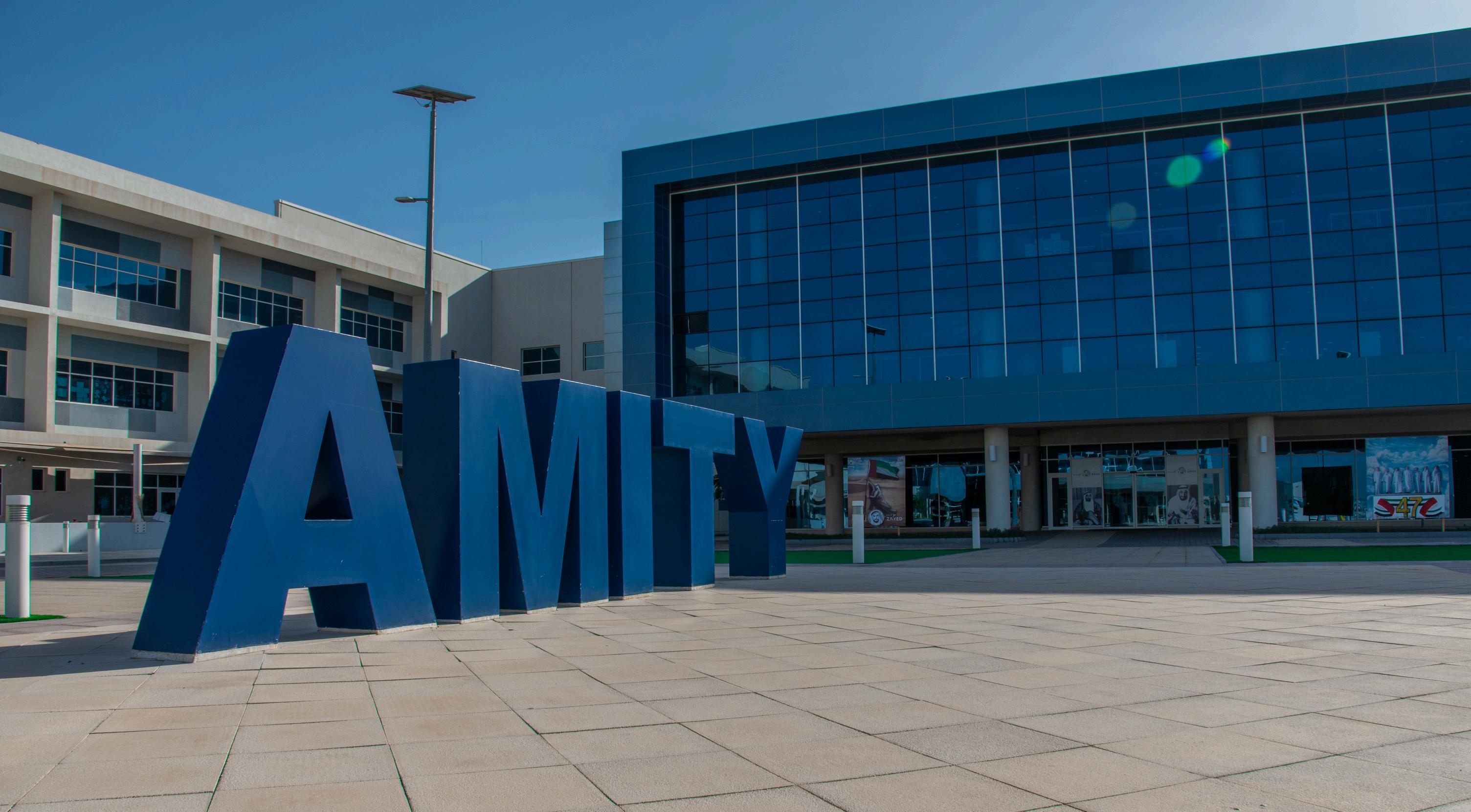
Our curriculum is developed to be equitable, inclusive, and future thinking It combines knowledge and skills to ensure students have a basis upon which to successfully build
Amity people are locally and globally minded citizens that are sensitive to the needs of others and proactively make a change to the world around them We value fostering community collaborations, developing selfworth, and human relationships.
The curriculum at Amity provides a roadmap that is sequential and builds knowledge and skills along with enriching opportunities outside of the walls of the classroom. It is structured so that it fosters cohesion, is inclusive to all learners and promotes future readiness, while acknowledging the importance of local, national and global communities.
Exam Board:
Pearson Edexcel
Specification link:Click Here
During year 12 term 1, students will study the following units:
Unit 1 – Health, Wellbeing and Sport.
Unit 28 – Fitness Testing
Students will study the content, complete various theory and practical tasks for each unit. Before learning how the assessment for each unit works. They will submit their assignment by an agreed deadline.
During year 12 term 2, students will study the following units:
Unit 1 – Health, Wellbeing and Sport
Unit 26 – Nutrition for Physical Performance.
Unit 28 – Fitness Testing.
Students will study the content, complete various theory and practical tasks for each unit. Before learning how the assessment for each unit works They will submit their assignment by an agreed deadline.
During year 12 term 3, students will study the following units:
Unit 1 – Health, Wellbeing and Sport
Unit 26 – Nutrition for Physical Performance. Unit 27 – Sports Psychology.
Students will study the content, complete various theory and practical tasks for each unit. Before learning how the assessment for each unit works. They will submit their assignment by an agreed deadline.
Assessments in the BTEC Level 3 International in Sport will take place at the end of each unit
Students will complete the coursework in line with the assessment specification. Prior to the deadline dates, practice assessments will take place Assessment Methods
Digital Resource(s) & Useful Links:
Edexcel - https://qualifications pearson com/en/qualifications/btec-international-level3/sport html
During term 1 students will opt for their enrichment option, this is between sports leadership, LAMDA, EPQ and mini-MBA.
In sports leadership for term 1, students will learn the values of a sports leader and how to apply this to a practical situation. Students will begin to build their experience by starting their volunteer hours.
Students will start to complete their learner evidence record; this is the document they will use as part of their assessment.
During term 2 in sports leadership, students will continue to complete their learner evidence records, ensuring their work is of a high standard ready for submission
Students will begin to plan and deliver their own sessions whilst being observed by their teacher Using the feedback they receive; students will plan a second session aiming to improve on this feedback.
During term 3 in sports leadership, students will continue to complete their learner evidence records, ensuring their work is of a high standard ready for submission
Students will deliver more sessions to show their development as a leader. Additionally, they will plan, deliver and evaluate a sports event.
Add the end of term 3, students will meet with their teacher to understand the progress they have made throughout the year. They will have term 1 in year 13 to finish the course
The assessment for sports leadership is ongoing, students will be assessed within each subsection of the course. All elements of the course must be completed for the qualification to be awarded
Digital Resource(s) & Useful Links:
Leadership Skills Foundation - https://leadershipskillsfoundation.org/ Microsoft Teams
Exam Board:
Pearson Edexcel
Specification link:
Unit 1: Principles and Applications of Biology I
This unit covers cellular biology and the anatomy and physiology of body systems in health and disease
Unit 2: Principles and Applications of Chemistry I
This unit covers some of the key chemistry concepts in atomic structure, bonding, the Periodic Table and reacting quantities. Further key science concepts are considered in Unit 6: Principles and Applications of Chemistry II
Unit3:Principlesand ApplicationsofPhysicsI
Thisunitcoverssomeofthe mainscienceconceptsinphysics withafocusontwokeyareas; electromagneticwavesusedin communicationandthe fundamentalaspectsof forcesandmotionin transportation.
Unit11:FunctionalPhysiology ofHumanBodySystems
Learnerswillfocusonthe physiologicalmakeupofthree humanbodysystems (digestive,endocrineand nervoussystems),howthe systemsfunctionandwhat occursduringdysfunction. Learnerswillalsoexplorethe roleofhomeostasisincontrolling andcoordinatingthebody systems
Unit22:MedicalPhysics Applications
Thisunitgiveslearnersan understandingofthe principlesandproductionof ionisingandnon-ionising radiation,applicationsof medicalphysics,andtheir usesinthediagnosisand treatmentofthehuman body.
Unit28:SustainableEnergy
Thisunitcoverstheissues surroundingtheglobaluse offossilfuelsandtheneed tofind alternative,cleanand sustainableenergysources
Assessment is designed to fit the purpose and objective of the qualification. It includes a range of assessment types and styles suited to vocational qualifications in the sector All assessment is internal, but some mandatory units have extra controls on assessment such as core practicals Qualifications in the suite are graded using a scale of P to D*, or PP to D*D*, or PPP to D*D*D*.
Digital Resource(s) & Useful
In BTEC Science we use Teams to support learning. Lesson and revision resources are placed in Files on the class Team
UAE Ministry of Education
Term 1
Texts around us - reading
Verses from Surah An-NurQuranic text
Al-Muthaqab Al-Abdipoetry
Incident - short story
Eid Day - a literary biography
Recklessness is proof of boredom - a literary article
My information (Nouns of time and placepreferential noun (My goal in life is writing
Specification link:Click Here
Term 2
Texts around us - reading
I see you tear stickspoetry
Until the last breath - a short story
Our Damascene House - a biography
In the lap of natureinformational text (Approach, hope, and initiation - the call - the substitute) towards (A story from the point of view of another narratorour old home) Writing
Term 3
Texts around us - reading
To my nation - poetry
Walking has positive effects - informational text
Anne of Green Heights - a novel Various grammatical exercises
Alliteration - rhetoric
How to be a successful young man - writing
Topic Quizzes: Quick checks for understanding, helping to catch gaps early and reinforce learning.
End-of-Unit Tests: Assess overall grasp of a unit, guiding future teaching adjustments.
Main Assessments: Summative exams at term's end, evaluating cumulative knowledge for final grading.
Digital Resource(s) & Useful Links:
https://moe.alefed.com
Exam Board: Pearson Edexcel
Personal PortfolioWorking on their own themes students are developing their own areas of interest and learning new skills in practical workshop sessions.
Studio Skills Research Exploration of a Theme Development Realisation.
Assessment Methods
Specification link:Click Here
Personal Portfolio –Depending on students' response to the first term theme, students will be advised to continue developing their own areas of interest or take the step to start responding to a new theme They will continue learning new skills in practical workshop sessions and have the freedom to delve deeper into their favorite areas of practical work.
Personal Portfolio -
Working to their chosen theme, students will be further developing their own areas of interest and learning new skills in practical workshop sessions
At this stage in the course, they may choose to revisit and improve earlier work now that their skills will have honed, and they will be deciding upon summer work and a focus for their final pieces in September of Year 13.
Digital Resource(s) & Useful Links: https://www.studentartguide.com/
Exam Board: OxfordAQA
Specification link: Click Here
Thistermstudentsare coveringalltopicsthatform partofDiversityofLiving Organisms(Unit1)andany relevantpracticalskills There are8chaptersintotal BiologicalMolecules,Cells, BiochemicalReactions, Transport,GasExchange, Variation,DNAReplication andProteinsynthesis
Towardstheendoftheterm thestudentswillpreparefora Mockexamonunit1totest theirunderstanding
Adetailedanalysisofthemock paper(CompletedinTerm1)will beconducted.Basedonthe results,specifictargetswillbeset foreachstudent,and personalisedimprovementplans willbecreatedtoenhance performanceinfutureexams
Unit2:Biologicalsystemsand disease
Thereare6chaptersintotal. Populations,Photosynthesis, Respiration,Energyand Ecosystems,Nutrientcycles, Inheritanceandselection
Remainingtopicsof
Unit2:Biologicalsystems anddisease
Thereare6chaptersintotal Populations,Photosynthesis, Respiration,Energyand Ecosystems,Nutrientcycles, Inheritanceandselection.
Unit3:Populationsand Genes
Thereare6chaptersinthis unitbutonly2chaptersmay becovered. PopulationsandEnergyand Ecosystems
We will use a mixture of questions that show a student's knowledge and skill application in each unit of work End of topic tests are usually out of 30 marks, as well exam style questions which are given for homework. Assessment Methods
Digital Resource(s) & Useful Links:
In Biology we use Teams to support learning Lesson and revision resources are placed in Files on the class Team. Interactive quiz links and videos will also be placed in posts on Teams The Miss Estruch Unit 1 videos, see links below, are a great revision resource
Digital Resource(s) & Useful Links:
https://www.youtube.com/watch? v=DxGU8GYm5g&list=PLOfYYgIrtVMjNF1xtpVSwo9TOn8ucxWUV https://www.youtube.com/watch?v=DxGU8GYm5g&list=PLOfYYgIrtVMhszVf5xUbQtoLobCXq njG
Pearson Edexcel
InTerm1studentswillbegin Unit1whichiscalled: ExploringBusiness
Theywillneedtousethebrief givenandcompletea portfolioover90hours in total Thecompletedportfoliowill thenbesubmittedtoan externalexaminerforthefirst grade.
Studentswilllearnabout typesofbusiness Theywill alsolearnthedifference betweenabusinessforprofit andnotforprofit. Theymustusethespecified businessestodoresearchand investigatetheiraims, objectivesandhowsuccessful eachbusinessis.
Specification link:Click Here
InTerm2studentswill continuewithUnit1and completemid-term. TheywillbeginUnit2, whichisworth90learning hours.
Thisunitrequiresstudents todevelopamarketing campaignforachosen business. Theymustcomplete researchandworkon courseworktasksexample
InTerm3studentswill completeunit2asa controlledassessment whichmeanstheyhavea fixednumberofhoursto completeasettask. Thefirsttwounitsare mandatoryandmakeup halfofthe360learning hoursforthefull qualification.
InthefinalmonthofTerm3 studentsshouldbegiven task23whichisforwork experience. Theywillneedtopreparea bookletwhichshouldbe takenandusedduringthe week.
BTEC Students are continually assessed as they have to hand in sections by set deadlines. Once they have completed all pass, merit and distinction criteria this is then marked in full to be externally assessed outside of school.
Students will be given quizzes and be expected to present work in front of the class for some assessments. They will also be expected to review progress every week to ensure they are completing all set tasks given
STUDCO website advised to look at exemplars from other students.
BTEC hub Abu Dhabi just set up between BSAK and Amity school to address student needs on different units. Dragons Den and Shark Tank programs used for Unit 19.
Exam Board: OxfordAQA
What are we learning each term?
Atomic Structure
-The atom
-Models of atomic structure
-Relatived mass and the Mass spectrometer
-Electronic structureIonisation energy
-Trends in First Ionisation Energy
Quantitative Chemistry
-The Mole
-Equations and calculations
-Titrations
-Formulas, yield, and Atom
EconomyBonding
-Ionic bonding
-Covalent bonding
-Shapes of molecules
-Polarisation and Intermolecular Forces
-Metallic
Specification link: Click Here
Bonding and Properties of Materials Energetics
-Enthalpy changes
-Calorimetry
-Hess's LawKinetics, Equilibria, REDOX reactions
Reaction rates
-More on reaction rates
-Reversible reactions
-The equilibrium constant
-Redox reactions
Periodicity
-Group 2 (The alkaline Earth metals)
-Uses of the Group 2 elements -Group 7 (The halogens)
-Halide ions
-Tests for ions
Organic Chemistry
introduction
-Basic Introduction into Organic Chemistry
-Isomerism, Alkanes and halogenoalkanes
-Alkanes and petroleum
-Alkanes as fuels
-Chloroalkanes and CFCs
-Halogenoalkanes
Alkenes and alcohols
-Alkenes
-Addition ploymers
-Alcohols
-Ethanol production
-Oxidation of alcohols
Organic analysis
-Tests for functional groups
-Analytical techniques
We will use a mixture of questions that show a student's knowledge and skill application in each unit of work. End of topic tests are usually out of 30 marks, as well exam style questions which are given for homework Assessment Methods
Resource(s)
All lesson PowerPoints are shared with students via Teams
For each topic, there is a Seneca assignment to help refresh the content and deepen understanding: Seneca Learning.
Link 1 | Link 2 | Link 3 | Link 4
Exam Board:
Pearson Edexcel
Unit A1: Skills Development, you will explore key fundamentals of media practice, learning how skills are integrated and connect to generate developed outcomes
In this term, we will focus on key Media terminology and concepts, then develop the basics of lens skills to fulfill a brief called Energy, designing and delivering a full campaign for a sustainable energy company
Specification link:Click Here
Continuation of A1: Skills Development, you will explore key fundamentals of media practice, learning how skills are integrated and connect to generate developed outcomes
In this term, we will focus more on professional skills, meeting a new brief, with the outcome being a magazine.
Continuation of A1: Skills Development, you will explore key fundamentals of media practice, learning how skills are integrated and connect to generate developed outcomes.
We will continue to develop the A1 skills, with this term’s outcome being a film-based artefact.
This unit is entirely assessed on the portfolio of work generated by the student. We will assess some of the pieces this year, in accordance with the Subject Specialist from Pearson. This timetable will be confirmed during Term 1. Assessment Methods
Digital Resource(s) & Useful Links: https://revisionworld com/a2-level-level-revision/media-studies-level-revision
Exam Board:
Cambridge International
Paper 1 Topics:
Information
Representation
Software
Hardware
Paper 2 Topics:
Software Development
Assessment Methods
Paper 1 Topics:
Communication
Specification link:Click Here
Processor Fundamentals
Data Security
Paper 2 Topics:
Programming Paradigms
Data Types & Structures
Paper 1 Topics: Ethical Considerations Databases
Paper 2 Topics: Algorithms
In Computer Science, students will undertake a series of both practical and written assessments. Where there is a programming element, students will be given a programming ‘problem’ to solve in that language Each topic will have an end-of-topic assessment, as well as formative assessments throughout the teaching cycle, such as verbal discussions, homework and extension activities
Digital Resource(s) & Useful Links:
Cambridge International AS and A Level Computer Science Coursebook: ISBN 9781108733755
All digital resources are shared with students via OneNote
Pearson Edexcel
In Year 12, students develop a strong foundation in advanced design thinking, creative problem-solving, and technical knowledge Through practical projects, research tasks, and theory lessons, they learn how to create thoughtful, sustainable, and userfocused design solutions. Learning is mapped to the A Level curriculum, ensuring theory is delivered in context and students build real-world skills.
Students begin the year by designing and developing a modern desk lamp for a specific user. They explore how materials perform, how light affects mood and productivity, and how products can be made responsibly. They use CAD (Fusion 360) to model their ideas and create prototypes using workshop equipment. Alongside practical work, students learn about:
Specification link:
Here
This term focuses on designing and making a fullsized, functional stool Students learn about production methods, design history, and technical skills. They explore how design movements influence modern products and how ethical and environmental considerations shape good design. Key learning includes: Workshop skills including turning, shaping, and joining wood
Scales of production and batch manufacture Quality control, finishing, and tolerances Influential design movements and their relevance today
Students begin their major coursework project (NEA) by identifying a real design problem and exploring it in detail. They learn how to carry out meaningful research, speak to users, write a clear specification, and begin developing early design ideas. They also learn:
How to plan an iterative design journey
How to use a range of design strategies and user feedback
Ethical design and inclusive thinking
This term sets the groundwork for the major project they will continue into Year 13.
Material categories and properties (timbers, polymers, smart materials)
Ergonomics, user needs, and anthropometrics
Sustainability and life cycle analysis
Manufacturing methods and safe working practices
Component 1 - 50% of qualification
Written Examination: The exam is 2 hours long and worth 100 marks It includes a variety of question types, such as calculations, short-answer questions, open-response questions, and extended-writing questions
Component 2 - 50% of qualification
Non-examined assessment. 100 marks - The investigation report is internally assessed and externally moderated
Digital Resource(s) & Useful Links:
https://www.pearsonschoolsandfecolleges.co.uk/Secondary/%20DesignAndTechnology/1416/ EdexcelGCSEDesignandTechnology/Samples/Samplecha%20pterfromEdexcelGCSEGraphicProd ucts/EdexcelGCSEGraphic%20ProductsStudentBooksamplechapter pdf%20http:/www mrdt com/materials/paperandboardtypes htm%20%20http:/www bobst com/uken/products/hot -foilstamping/process/#.WKRJmrlXXIU
Exam Board:
Pearson Edexcel
Specification link:
In Term 1 students begin Theme
1 which covers
The nature of Economics
Positive and normative statements
The scarcity problem
The principles of demand and supply
Production possibility frontiers
Specialisation and division of labour
Consumer behavior
The price mechanism
Price elasticity
Income elasticity
Cross elasticity
Market failure
Externalities positive and negative
The free rider problem
Taxation and subsidies
Supply side government policy
Maximum and minimum prices
Market speculation and ubbles
Balance of payments
The features of aggregate demand
Assessment Methods
Term 2 students' study
Macro-economic performance and policy
Balance of payments
Long run aggregate supply curve
Keynes theory
Net trade balance
The circular flow of income injections and withdrawals
Govt expenditure and equilibrium distribution of incomes
The multiplier and causes of growth
Output gaps and the economic trade cycle
Macro economic objectives
Conflicts and trade offs between objectives
In Term 3 students will learn about
Aggregate supply
National income and the circular flow of income
The multiplier effect
Causes, benefits and costs of economic growth
Output gaps
Fiscal policy
Monetary policy
Supply side policies
Mid-term and end of term summative tests. Exam question practise throughout the course, homework weekly between 45 mins and 1 hour
Digital Resource(s) & Useful Links:
Tutor2U videos, class notes. Mr Zee’s PowerPoint information. Econodal on Youtube tutorials Click Here
Pearson Edexcel
Unit 1: Poetry & prose fiction
In this unit students will study post-2000 poetry and prose fiction Students will study a selection of poems and consider and compare the choices made and the issues presented by modern day poets Students will develop knowledge of poetic form, content and meaning and learn to make connections between poems. In studying prose fiction, it is the writers’ use of narrative that should be taught alongside the critical appreciation of the text and consideration of any contextual influences on the text
Unit 2: Drama texts
Specification link:Click Here
Students will study one pre1900 and one post-1900 drama text They will explore the use of literary and dramatic devices and the shaping of meanings in their chosen drama texts Teaching and wider reading should address the significance and influence of contextual factors and engage with different interpretations of the chosen drama texts
Unit 1 and 2 Review and consolidation
Focusing on exam technique, students will review their learning and concentrate on preparing for examinations.
We will also begin preparatory reading for Unit 3.
Students will undertake practice essays at various points in the term, culminating in examcondition assessments at the end of the year. There will be a total of four exam essays practised over the course of the year, two for each unit.
Digital Resource(s) & Useful Links: https://www.digitaltheatreplus.com/ https://www.sparknotes.com/
Pearson Edexcel
In Term 1, students will study Unit 1: Language, Context and Identity This unit introduces the frameworks used for linguistic analysis and applies them to a range of 21stcentury texts, both written and spoken Students will examine how language varies according to audience, purpose and mode, and how it is used to construct identity. They will explore gender, sociolect and idiolect, as well as issues of representation and power. By the end of the term students will be confident in applying terminology and producing analytical and comparative essays on unseen texts.
Specification link:
In Term 2, students will move on to Unit 2: Language in Transition. Here the focus is on how English has changed across time and geography, from Early Modern English to present-day varieties Students will study shifts in lexis, grammar, semantics and orthography, and consider the role of social, political and technological change. They will also explore global varieties of English and debates around prescriptive and descriptive approaches to language.
Consolidation and IAS Prep:
In Term 3, the emphasis will be on consolidation and exam preparation. Students will review the skills gained across both units, practise timed responses and focus on comparative analysis of unseen texts. Revision will also include evaluation of historical language change and theoretical perspectives By the end of the year students will be ready to sit two written examinations, each contributing 50% to the IAS award
Year 12 – International Advanced Subsidiary (IAS)
Students study Units 1 & 2, which are externally examined. Together they form the IAS qualification
Unit 1: Language, Context and Identity
Assessment method: Written exam (2 hours)
Weighting: 50% of IAS (25% of full IAL)
Unit 2: Language in Transition
Assessment method: Written exam (2 hours)
Weighting: 50% of IAS (25% of full IAL)
Qualification Options (IAS)
At the end of Year 12, students may “cash in” Units 1 & 2 for a formal IAS qualification. This is equivalent to an AS Level and is recognised internationally Students may stop here and still hold a qualification. If they continue into Year 13, their IAS results carry forward and combine with Units 3 & 4 (IA2) to award the full International A Level (IAL)
Digital Resource(s) & Useful Links:
https://www.savemyexams.com/international-a-level/english-language/edexcel/?ut
https://qualifications.pearson.com/en/qualifications/edexcel-international-advancedlevels/english-language-2015 coursematerials html
https://quizlet.com/in/265682148/edexcel-ial-english-language-unit-1-flash-cards/
Exam Board:
OxfordAQA
What are we learning each term?
PhysicalGeography
CoastalLandscapes
Thissectionofthecourse focusesoncoastalzones, whicharedynamic environmentsinwhich landscapesdevelopbythe interactionofwinds,waves, currentsandterrestrialand marinesediments.
HumanGeography Resources
Thissectionexaminesthe large-scaleexploitationof unevenlydistributednatural resources,akeyfeatureof ourera Studentsexplorethe growingdemandforwater andenergy,theirglobaland regionaltransfers,andthe connectionsbetweenthe physicalenvironment,human needs,sustainability,and conflict.
Term3willbespentpreparing andsittingtheASlevel examination.
Followingitscompletion,we willbeginpreparationforthe A-levelprogramme
Assessment Methods
Students throughout the year will undertake routine past paper practice and will sit a mock examination in January. This is ahead of the external AS level examination which will take place in Term 3
Digital Resource(s) & Useful Links:
All digital resources are provided and shared through teams. Students may find material on YouTube useful to help support learning and revision.
Exam Board: Pearson Edexcel
Option1C: Germany,1918–45 Thedemocratic experiment1918–29
Thecreationofthe WeimarRepublic; Crisisandsurvival 191-24;The ‘GoldenYears 1924-29;Weimar Culture PoliticalParties, 1919–33 Politicalchangetill 1923;Failureand survival1924-28; Breakthroughand Weimarcollapse 1929-32; consolidationof power1933-34
Option1C:Russia, 1917–91:From LenintoYeltsin Communist governmentinthe USSR,1917–91 Establishing control1917-24; StalininControl 1924-53;Reform, Stability, Stagnationand Collapse1953-91 Industrialand agricultural change,1917–91 Towardsa command economy1917-28; Industryand Agricultureinthe Stalinera; Changingpriorities forIndustryand Agriculture195391
Assessment Methods
Option1C: Germany,1918–45 Germany,1933–39 Repressionand control;Shaping societyandthe creationofthe Volksgemeinschaft ;EconomicPolicies GermanyatWar 1939-45 Managingthewar economy; controllingthe civilianpopulation; conquestof Poland;losingthe war
Specification link:Click Here
Option1C:Russia, 1917–91:From LenintoYeltsin Controlofthe people,1917–91 Media, Propagandaand Religion;The SecretPolice;The stateandcultural change Social developments, 1917–91 SocialSecurity; Womenandthe Family;Education andYoungPeople
Option1C: Germany,1918–45
Revisionand examtechnique
Option1C:Russia, 1Option1C: Russia,1917–91: FromLeninto Yeltsin
Revisionandexam technique
In History we use a variety of assessment methods including in class quizzes and retrieval practice along with practice exam questions and past papers
Digital Resource(s) & Useful Links:
Alpha History
GCSE Modern World History (johndclare.net)
Specification link:
InthefirsttermoftheExtended ProjectQualification(EPQ), studentsareintroducedtothe structureandrequirementsof thequalification.Thefocusison topicselection,encouraging studentstochooseanareaof personaloracademicinterest Theyformulateaspecific researchquestionorproject titleandbegininitialproject proposals.Thistermis dedicatedtodevelopingkey skillssuchasresearchplanning, sourceevaluation,andtime management.Studentswork closelywiththeirsupervisorsto finalizeaprojectplan,setclear objectives,andestablisha timelinewithkeymilestones By theendofthisterm,students shouldhaveawell-defined projectproposalandaclear roadmapforthenextsteps
IThesecondtermisdedicated toin-depthresearchandthe developmentoftheproject Studentsareexpectedtogather andcriticallyanalyze informationfromavarietyof sources,whileregularly documentingtheirprogressand reflectionsintheirprojectlogs Dependingonthetypeof project(e.g.,dissertation, investigation,artefact,or performance),studentseither beginwritingtheirreportor constructingtheirfinalproduct. Supervisorsprovidefeedback duringregularmeetingsto guidetheresearchprocessand addressanychallenges This termispivotalinshapingthe depthandqualityoftheproject asstudentsrefinetheir arguments,design,orcreative outputs
inthefinalterm,studentsfocus oncompletingtheirEPQand preparingforthepresentation Thisincludesfinalizingthe writtenreportorcreatingthe finishedartefact,ensuringthat theprojectmeetsthespecified assessmentcriteria Students engageinself-assessment, reflectingontheirlearning, challengesfaced,andhowthey addressedtheseissues.The presentationcomponentisan essentialpartoftheEPQ,where studentsexplaintheirresearch, process,andconclusionstoan audience,demonstratingboth theirknowledgeandskills gained Bytheendoftheterm, studentssubmittheircompleted project,projectlog,anddeliver theirpresentation,markingthe culminationoftheir independentresearchjourney
Students are assessed on the completion of the following 3 things
Production Log
Presentation Assessment Methods
Produced Artefact or Report
Exam Board:
UAE- Ministry of Education
What are we learning each term?
"Steadfastness in the Truth"
"Reason and Revelation"
"Chastity"
"Financial Contracts in Islam"
"Arabic Language and Culture"
"The Battle of the Parties" (referring to an event in Islamic history)
"The Holy Quran and Scientific Miracles"
"Etiquette of Dialogue"
"Sources of Islamic Legislation"
"Key Aspects of Planning in the Life of the Prophet, peace be upon him"
"Following the Example of the Prophet Muhammad, peace be upon him"
"Categories of Hadith"
"The Islamic Approach to Building a Family"
"Umm Salama, may Allah be pleased with her"
(referring to a companion of the Prophet)
"Moral Advice and Guidance
"Al-Mutawatir and AlAhad" (referring to types of Hadith narrations)
"Consultation in Islam"
"Principles of Islamic Jurisprudence"
"Sustainability in the Islamic Approach"
Method of thinking in Islam
Islam and social communication
Imam Al-Bukhari: Commander of the Faithful in Hadith
Assessment Methods
Topic Quizzes: Quick checks for understanding, helping to catch gaps early and reinforce learning
End-of-Unit Tests: Assess overall grasp of a unit, guiding future teaching adjustments
Main Assessments: Summative exams at term's end, evaluating cumulative knowledge for final gradin
Digital Resource(s) & Useful Links:
https://www.houseofquran.com/quransys/qsys-ar.html
UAE- Ministry of Education
"Steadfastness in the Truth""Reason and Revelation"
"Chastity"
"Financial Contracts in Islam"
"Arabic Language and Culture"
"The Battle of the Parties" (referring to an event in Islamic history)
"The Holy Quran and Scientific Miracles"
"Etiquette of Dialogue"
"Sources of Islamic Legislation"
"Key Aspects of Planning in the Life of the Prophet, peace be upon him"
"Following the Example of the Prophet Muhammad, peace be upon him"
"Categories of Hadith"
"The Islamic Approach to Building a Family"
"Umm Salama, may Allah be pleased with her"
(referring to a companion of the Prophet)
"Moral Advice and Guidance
"Al-Mutawatir and AlAhad" (referring to types of Hadith narrations)
"Consultation in Islam"
"Principles of Islamic Jurisprudence"
"Sustainability in the Islamic Approach"
Method of thinking in Islam
Islam and social communication
Imam Al-Bukhari: Commander of the Faithful in Hadith
Our assessments include topic quizzes for quick checks, identifying gaps early, and reinforcing learning. End-of-unit tests measure understanding and guide teaching adjustments, while main assessments at term’s end evaluate cumulative knowledge for final grades.
Digital Resource(s) & Useful Links:
https://www.houseofquran.com/quransys/qsys-ar.html
Exam Board:
Pearson Edexcel
In Term 1 of A Level
Mathematics, students will begin studying topics from the Pure unit.
Pure
The Binomial Expansion Quadratics
Equations & Inequalities
Graphs & Transformations
Straight Line Graphs
Differentiation
Algebraic Methods
Circles
Trigonometric Ratios
Trigonometric
Identities & Equations
Vectors
Integration
Specification link: Click Here
In Term 2, students will continue studying content from both the Pure and Applied strands.
Pure Exponentials & Logarithms
Applied (Statistics)
Probability
Data Collection
Measures of Location & Spread
Representations of Data
Correlation
Statistical Distributions
Hypothesis Testing
Applied (Mechanics)
Constant Acceleration
Forces & Motion techniques in context
Variable Acceleration
In Term 3, as students complete the Year 12 content, time will be dedicated to revision for the mock exams while also beginning to introduce Year 13 topics.
Pure Algebraic Methods
Radians
Sequences & Series
Applied (Statistics)
Regression, Correlation & Hypothesis Testing
Conditional Probability
The Normal Distribution
Students are regularly assessed in class to check their progress. Summative assessments take place at the end of topics, making use of past paper questions and will include some prior learning to ensure retrieval of previous content. Mock examinations will take place in the summer term of Year 12
Digital Resource(s) & Useful Links:
Topic questions, past papers and links to useful resources can be found on the Independent Study Teams page, as well as the Maths Teams. Students have access to both a physical and digital copy of the course textbook Due to the nature of a linear course, where prior knowledge is needed in order to access new learning, regular revision is built into lessons and homework, however independent study on top of this is an expectation
During term 1 in year 12 PE, the boys will take part in team-based sports for the first half term. Contributing to different tournaments as a class and the roles and responsibilities required within a team. Girls will be completing a unit of work on swimming.
After half term, students will be given the choice between two sports, they will select this option for a five-week block. At the end of the block students will be provided with the opportunity to rechoose their sport. We have planned this to ensure ownership of their PE and increase participation and enjoyment levels within key stage 5 PE.
During term 2 in year 12 PE, all students will be given the choice between two sports, they will select this option for a five-week block. At the end of the block students will be provided with the opportunity to rechoose their sport. We have planned this to ensure ownership of their PE and increase participation and enjoyment levels within key stage 5 PE.
Within this term, students will be given the opportunity to choose sailing for a 4-week block.
During term 3 in year 12 PE, all students will be given the choice between two sports, they will select this option for a five-week block. At the end of the block students will be provided with the opportunity to rechoose their sport. We have planned this to ensure ownership of their PE and increase participation and enjoyment levels within key stage 5 PE. Additionally, during this term the boys will have their swimming block for 5 weeks
There is no formal assessment in PE for year 12 students
Digital Resource(s) & Useful Links:
Microsoft Teams is where the PE department share all resources with students.
Exam Board: OxfordAQA
What are we learning each term?
In Term 1, we will cover Practical Work in Physics, Forces in Equilibrium, Motion, Newton's Laws of Motion, and Force and Momentum. The topics we will explore include:
Practical Work in Physics: Measurements and uncertainties
Moving on from GCSE Making careful measurements
Everyday physical instruments
Analysis and evaluation
Forces in Equilibrium:
Vectors and scalars
Balanced forces
The principle of moments
More on moments
Stability
Equilibrium rules
Specification link: Click Here
In Term 2, we will cover Work, Energy and Power, Materials, Matter and Radiation, and Radioactivity. The topics we will explore include:
Work, Energy and Power: Work and energy
Kinetic energy and potential energy
Power
Energy and efficiency
Materials: Density
Springs
Deformation of solids
More about stress and strain
Matter and Radiation: Inside the atom
Stable and unstable nuclei
Photons
Particles and antiparticles
In Term 3, we will cover Electric Current, Direct Current Circuits, Oscillations and Waves, Optics, and Quantum Phenomena. The topics we will explore include
Electric Current:
Current and charge
Potential difference and power
Resistance
Components and their characteristics
1Direct Current Circuits: Circuit rules
More about resistance
Electromotive force and internal resistance
The potential divider
Oscillations and Waves:
Oscillations
Energy and oscillations
Forced vibrations and resonance
On the Move:
Speed and velocity
Acceleration
Motion along a straight line
Free fall
Motion graphs
Projectile motion 1
Newton's Laws of Motion:
Force and acceleration
Using F = ma
Terminal speed
Force and Momentum:
Momentum and impulse
Impact forces
Conservation of momentum
Elastic and inelastic collisions
Radioactivity:
The discovery of the nucleus
The properties of alpha, beta, and gamma radiation
More about alpha, beta, and gamma radiation
The dangers of radioactivity
Radioactive decay
Radioactive isotopes in use
Nuclear energy levels
Waves and vibrations
Measuring waves
Wave properties 1
Wave properties 2
Stationary and progressive waves
More about stationary waves on strings
Using an oscilloscope
Ultrasound imaging
Optics:
Double slit interference
More about interference
Diffraction
The diffraction grating
Refraction of light
More about refraction
Total internal reflection
Quantum Phenomena:
Photoelectricity
More about photoelectricity
Collisions of electrons and atoms
Energy levels in atoms
Energy levels and spectra
X-rays
Wave-particle duality
We will use a mixture of strategies to assess students such as quizzes, unit tests and exam style questions that show a student's knowledge and skill application in each unit of work. Pupils sit an end of topic tests for most units covered, in some instances we combined unit assessments.
Digital Resource(s) & Useful Links:
All lesson PowerPoints and worksheets can be found in Teams
For revision notes, visit Save My Exams AQA: Save My Exams AQA Revision Notes.
For past papers, check Physics and Maths Tutor: Physics and Maths Tutor Past Papers
For practical physics videos, visit: Physics Practical Videos.
For content videos, check: Content Videos
In Term 1, students will be introduced to the VESPA programme in the first half term, which is engineered to support students making the transition into Sixth Form and developing an “A Level Mindset ”
In the second half term, the theme focuses on Mental Health and Emotional Wellbeing
In Term 2, the themes are readiness for work, which will begin to prepare students for completing their work experience in the Summer Term of Year 12, and Diversity and Inclusion,
In Term 3, we focus on the themes of Planning for the Future, as Year 12 students begin to think more carefully about their university destinations and the application process, and Health and Wellbeing to support students in managing their physical and emotional wellbeing in conjunction with their studies
Digital Resource(s) & Useful Links:
Resources and handouts will largely be shared in the PSCHME lesson, although occasionally students will be directed to articles and extra support that links to their learning in class. In the Sixth Form, we also encourage our students to have some input into what is covered in PSHCME to ensure that these times in the week are relevant to the experiences they are having at different points in the academic year
Exam Board: Pearson Edexcel
Specification link:
Topic:CognitivePsychology
TheCognitivePsychologyunit exploresmentalprocessessuch asperception,memory,and problem-solving,focusingon howindividualsprocess,store, andretrieveinformation.It examinesmodelsofmemory, liketheMulti-StoreModeland WorkingMemoryModel, alongsideresearchmethods usedtostudycognitive functions
Topic:ResearchMethods
TheResearchMethodsunit focusesonthevarious methodologiesusedin psychologicalresearch, includingqualitativeand quantitativeapproaches,data collectiontechniquesand ethicalconsiderations. Studentslearntodesign experiments,conductstatistical analyses,andcriticallyevaluate researchfindingstounderstand theirimplicationsinreal-world contexts.
Topic:ResearchMethods
Intermtwo,studentswill continuewiththeResearch Methodsunit,asit encompassesthemost contentandlearning objectiveswithintheGCSE Psychologycourse Thisunit coversawiderangeoftopics andisessentialfor understandinghow psychologicalresearchis conductedandanalyzed
Topic:SocialPsychology
TheSocialPsychologyunit examineshowindividuals' thoughts,feelings,and behaviorsareinfluencedby thepresenceandactionsof others,exploringkey conceptssuchasconformity, obedience,groupdynamics, andsocialidentity.Students analyzevariousresearch studiesandtheoriesto understandthecomplexities ofhumaninteractionsand theimpactofsocialcontexts onindividualbehavior.
Topic:LearningTheories
TheunitonLearningTheories exploreskeyconceptssuchas classicalconditioning,operant conditioning,andsociallearning theory,examininghowthese theoriesexplainbehaviorandthe processesinvolvedinlearning Studentsanalyzethe contributionsofnotable psychologists,evaluatethe strengthsandweaknessesofeach theory,andconsidertheir applicationsinreal-world contexts,includingeducationand therapy.
Topic:BiologicalPsychology
TheBiologicalPsychologyunit explorestherelationship betweenbiologicalprocessesand behavior,focusingontopicssuch asthenervoussystem, hormones,genetics,and neuroanatomy Studentsexamine howthesebiologicalfactors influencementalprocessesand behavior,usingcasestudiesand researchtounderstand psychologicaldisordersand treatmentsfromabiological perspective.
In Psychology, students will complete a learning check half-way into each unit and an end of unit assessment once each unit has been completed There will also be practice essay questions that are completed in lesson time once students have covered the appropriate content Assessment Methods
Digital Resource(s) & Useful Links:
In Psychology, all lesson resources, revision materials and assessment materials are posted on the Teams page of the class, which all students have access to.
Exam Board:
Pearson Edexcel
What are we learning each term?
Tema 1: La evolucion de la sociedad española
Los cambios de la estructura familiar
El mundo laboral
El impacto turistico en Espaniua
Specification link:Click Here
Tema 2: La cultura en el mundo de la lengua hispana
Unidad 1: la música hispana
•El desarrollo de la música en el mundo hispanohablante
•España
•La República dominicana
•Argentina
•México
•La música contemporánea
Tema 3: La inmigracion y la sociedad multicultual española
The positive impact of immigration of
Spanish Society
Challenges of immigration and integration
Public and social responses to immigration
Research Personal project
Prepare an introduction
Literary text
La casa de Bernarda Alba
Assessment Methods
Past Papers, essay writing, Speaking Cards
End of unit assessments
Digital Resource(s) & Useful Links:
https://boost-learning com https://elpais.com/
